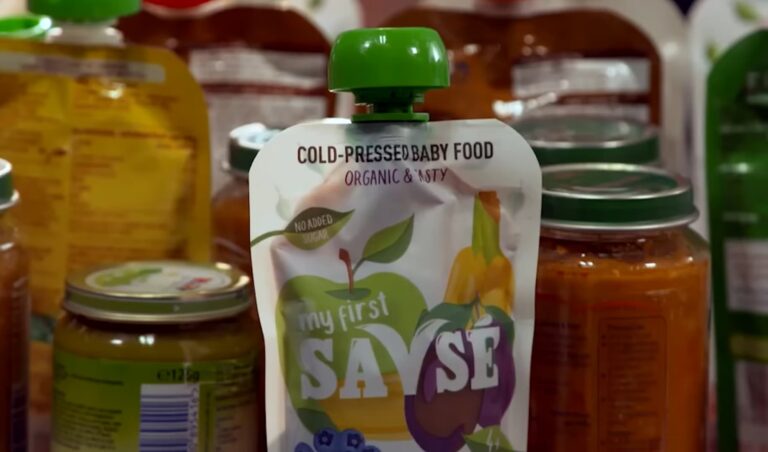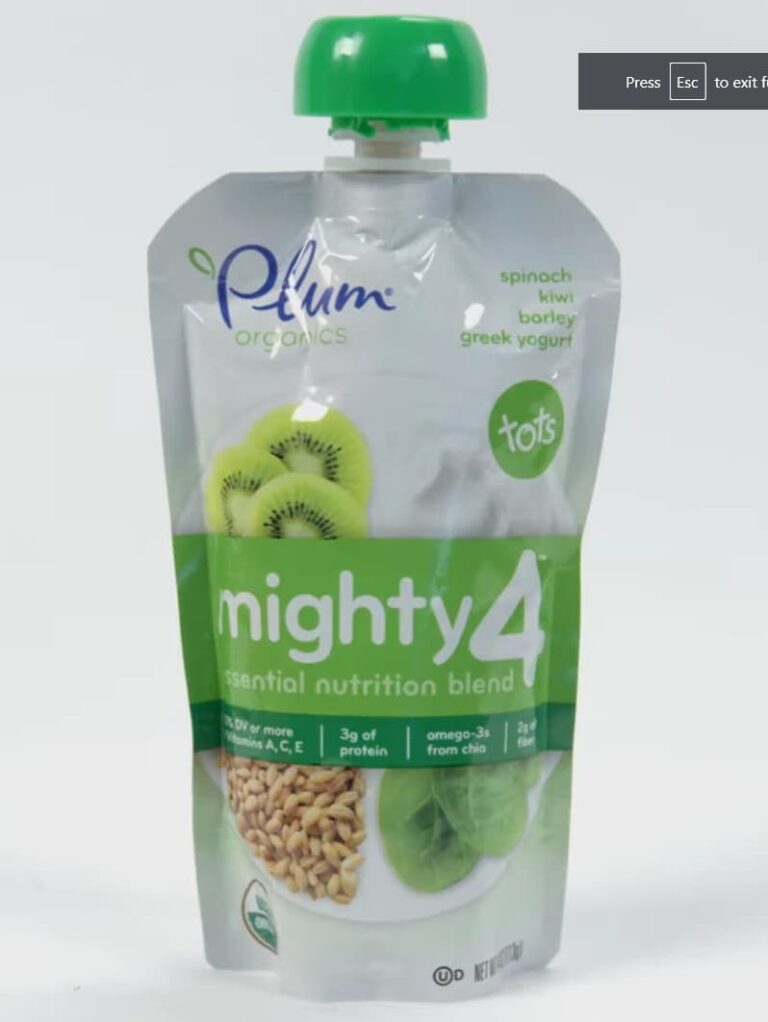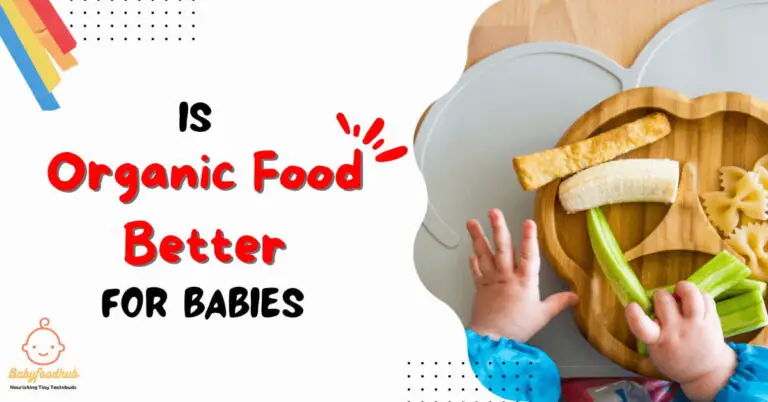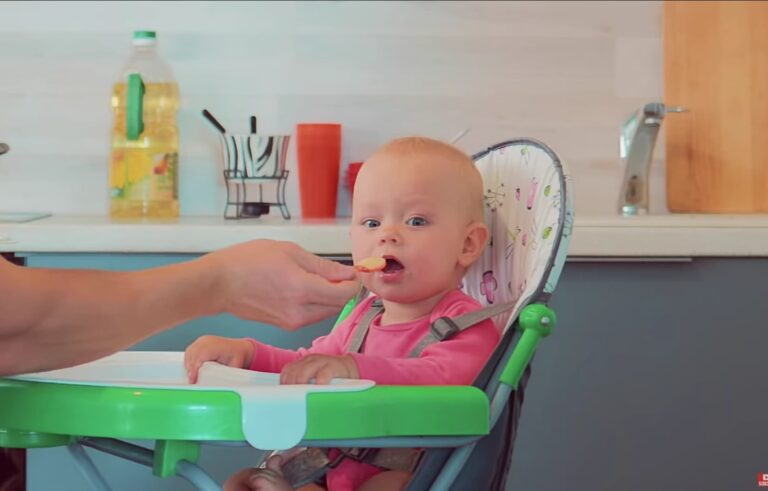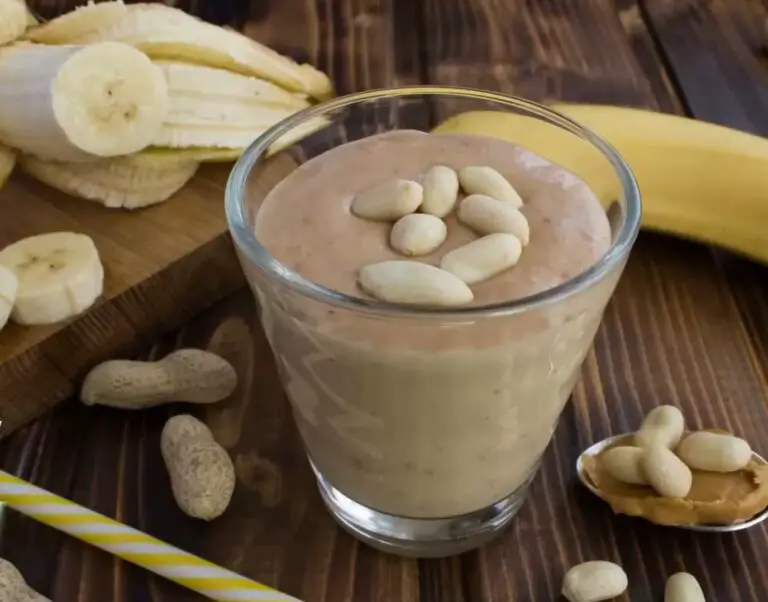Is packaged baby food healthy?
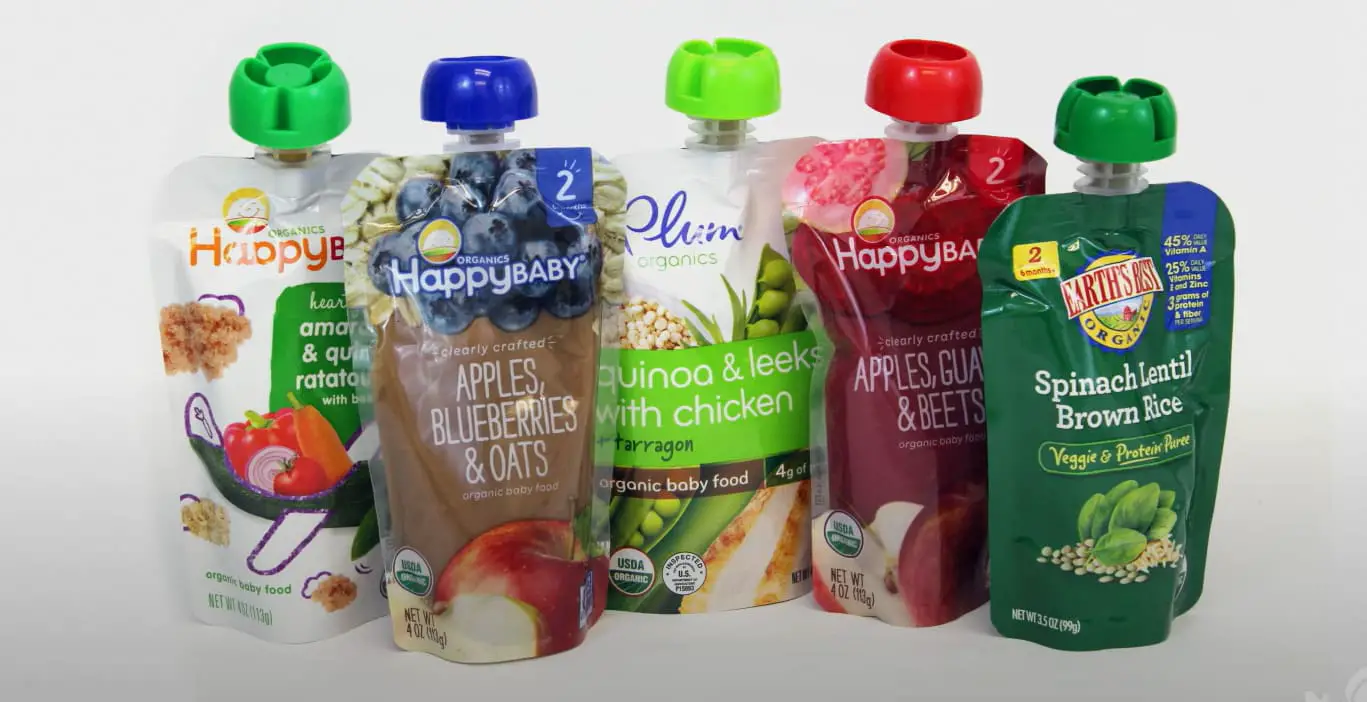
Packaged baby food can be healthy if chosen carefully and used as a supplement to a varied and balanced diet. Introducing solids to a baby’s diet is an important milestone, and many parents turn to packaged baby food for convenience.
These ready-to-eat pouches and jars often boast claims of being nutritious, flavorful, and safe for babies. However, it is crucial for parents to carefully evaluate the nutritional value of packaged baby food and consider its long-term effects on their child’s health.
While some brands offer nutritious options made with quality ingredients, others may contain excessive sugar, sodium, preservatives, or artificial additives. This article examines the pros and cons of packaged baby food, providing essential information to help parents make informed decisions about their baby’s nutrition.
The Importance Of Nutrition For Babies

Nutrition plays a vital role in the development of babies. However, the question arises whether packaged baby food is a healthy choice or not. Let’s explore the importance of nutrition for babies and evaluate the healthiness of packaged baby food.
Packaged baby food has become increasingly popular among parents due to its convenience and ease of use. However, many individuals question whether these pre-packaged options are truly healthy for babies. One essential aspect to consider when evaluating the nutritional value of packaged baby food is the importance of nutrition for babies.
By understanding the nutritional needs in the early stages of life and the impact of early nutrition on long-term health, we can make informed choices regarding the well-being of our little ones.
Nutritional Needs In The Early Stages Of Life
- Babies require a well-balanced diet to support their rapid growth and development.
- Key nutrients needed during the early stages include carbohydrates, proteins, healthy fats, vitamins, and minerals.
- Breast milk or formula is crucial during the first few months as it provides all the necessary nutrients.
- As babies transition to solid foods, it is vital to introduce a variety of foods to ensure they receive a wide range of essential nutrients.
- Freshly prepared homemade baby food can be an excellent option to meet these nutritional needs.
Impact Of Early Nutrition On Long-Term Health
- Research suggests that early nutrition has a profound impact on a child’s growth, metabolism, and overall health.
- Adequate nutrition in infancy is linked to reduced risk of obesity, diabetes, and chronic diseases later in life.
- Proper nutrition supports optimal brain development, cognitive function, and immune system function.
- Introducing a diverse range of foods early on can help prevent allergies and aversions to certain foods.
- It is important to prioritize whole foods over highly processed options to provide the necessary nutrients and minimize the intake of artificial additives.
Ensuring proper nutrition for babies is crucial for their overall health and well-being. Understanding the nutritional needs in the early stages of life and recognizing the impact of early nutrition on long-term health can guide parents in making informed decisions when it comes to choosing the best options for their little ones.
By focusing on providing a balanced and varied diet, including freshly prepared homemade baby food, we can lay a strong foundation for our children’s healthy development.
Potential Risks Of Packaged Baby Food
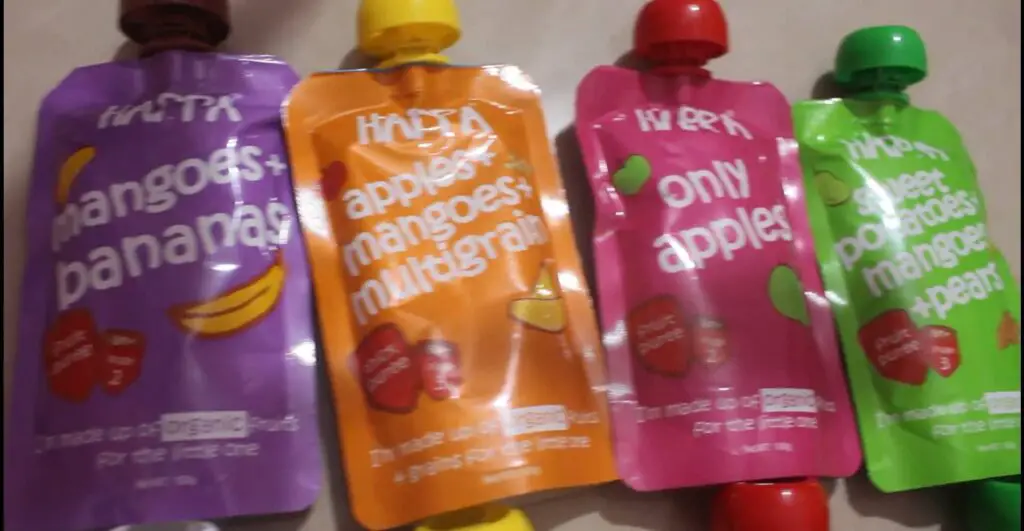
Packaged baby food may come with potential risks. While convenient, it is important to consider the nutritional value, preservatives, and added sugars. Ensuring a balanced diet with homemade options is recommended.
Packaged baby food has become increasingly popular due to its convenience and ease of use. However, it’s important for parents to be aware of the potential risks associated with feeding their little ones these pre-packaged meals. Here are a few key concerns when it comes to packaged baby food:
Unhealthy Ingredients In Packaged Baby Food
- Artificial flavors and preservatives: Some packaged baby foods contain artificial flavors and preservatives, which may not be ideal for your baby’s developing taste buds and digestive system.
- Added sweeteners: Certain brands add sugar, corn syrup, or other sweeteners to enhance the taste of their products. This can lead to a preference for overly sweet foods and potentially contribute to the development of tooth decay.
- High-fructose corn syrup: Another commonly found ingredient is high-fructose corn syrup, which has been linked to various health issues such as obesity, diabetes, and liver problems.
High Levels Of Sodium And Sugar In Some Products
- Sodium content: Keep an eye out for the sodium levels in packaged baby food, as excessive intake of sodium can harm your baby’s kidneys and increase the risk of hypertension later in life.
- Sugar content: Excessive sugar intake can lead to tooth decay, weight gain, and a higher likelihood of developing chronic conditions such as diabetes. Checking the labels for added sugars is crucial when choosing packaged baby food.
Lack Of Natural Nutrients In Processed Baby Food
- Loss of nutrients during processing: Processing and packaging can cause the loss of essential vitamins, minerals, and other nutrients found in fresh fruits, vegetables, and meats. Packaged baby food often lacks the same nutritional value as homemade options.
- Limited variety: Some brands offer a limited variety of flavors and ingredients, reducing the opportunity for babies to explore and develop a well-rounded palate.
It’s important to note that not all packaged baby food products are created equal. Reading labels and choosing options that prioritize natural and organic ingredients can help mitigate some of these risks. However, it’s always a good idea to consult with your pediatrician and consider incorporating homemade baby food into your little one’s diet to ensure they receive the best nutrition possible.
Remember, your baby’s health and well-being should always be the top priority.
Are There Any Health Benefits To Packaged Baby Food?
Packaged baby food can provide convenience, but it’s essential to consider its health benefits. While it may offer some nutrients, making fresh and homemade baby food is often a healthier option, as it allows you to control the ingredients and ensure your baby receives optimal nutrition.
Busy parents often rely on packaged baby food for its convenience. These products offer several advantages that make them a valuable choice for parents looking to nourish their little ones. Here are some health benefits of packaged baby food:
Convenience for busy parents:
- Ready-to-eat: Packaged baby foods save time and effort as they are conveniently available in pre-portioned servings, ready to be fed to your baby without the need for extensive preparation.
- On-the-go option: They provide a practical solution for parents who are frequently on the move, making it easier to feed their babies no matter where they are.
- Reduced mealtime stress: By eliminating the need for complex meal planning and cooking, packaged baby foods provide a stress-free solution for busy parents, allowing them to focus on other important tasks.
Availability of a variety of flavors and textures:
- Broad range of choices: Packaged baby foods come in an extensive assortment of flavors and textures, offering diverse taste experiences to expose babies to different recipes from an early age.
- Introduction to new foods: These foods enable parents to introduce their babies to various fruits, vegetables, proteins, and grains, helping to develop their palates and encourage them to accept a wide range of healthy food options.
- Gradual introduction of solids: Many packaged baby foods are designed with different stages in mind, progressing from smooth purees to chunkier textures, aiding in the transition from liquid diets to solid foods.
Enrichment with certain vitamins and minerals:
- Fortified with essential nutrients: Packaged baby foods often contain added vitamins and minerals, ensuring that babies receive adequate nutrition as they begin to explore solid foods.
- Targeted nutrients: These foods may be formulated with specific nutrients, such as iron or vitamin D, which are crucial for an infant’s growth and development.
- Consistency in nutrition: Packaged baby foods provide a consistent level of nutrients, reducing concerns about potential deficiencies and offering peace of mind to parents.
Packaged baby food offers various health benefits for busy parents. With their convenience, a wide range of flavors and textures, as well as enrichment with essential vitamins and minerals, they provide a practical solution to help nourish and introduce babies to a diverse and nutritious diet.
Frequently Asked Questions For Is Packaged Baby Food Healthy ?
Is Packet Baby Food Healthy?
Packet baby food can be a healthy option for your little one, providing nutrition and convenience.
Is Store Bought Baby Food Good For Baby?
Store bought baby food can be a good option for your baby’s nutrition.
Which Store Bought Baby Food Is Safest?
Experts recommend checking for organic and single-ingredient options when choosing safe store-bought baby food.
What Are Other Concerns Negatives To Using Premade Baby Food?
Pre-made baby food may have concerns such as additives, lack of nutrients, potential allergies, and limited taste exposure.
Conclusion
It is important to carefully consider the benefits and drawbacks of packaged baby food. While it may provide convenience and ease for busy parents, it is crucial to check the nutritional content and ingredients to ensure they align with a healthy and balanced diet for your baby.
Homemade baby food can offer greater control over the ingredients and allow for customization to your child’s specific needs. However, if you decide to take the packaged route, opt for brands that prioritize natural and organic ingredients, and avoid those that contain excessive sugars, salt, or additives.
Ultimately, the health and well-being of your baby should be the top priority, and choosing the right type of food can play a significant role in their development. With proper research and informed decision-making, you can provide your little one with nutritious and wholesome meals that support their growth and nourishment.

